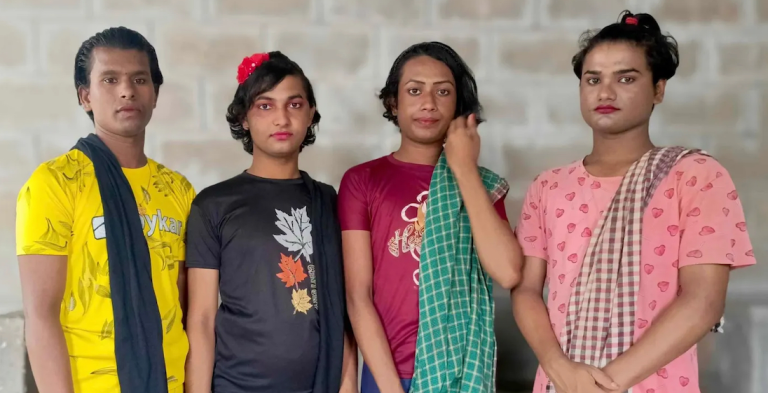
Transgender refugees endure violence and isolation in Bangladesh’s overcrowded camps

New York, N.Y. — The plight of Rohingya hijras and LGBTQ+ individuals in the sprawling refugee camps of Bangladesh has reached a critical point, with activists warning that dual layers of discrimination are placing this community at constant risk of violence, isolation, and deprivation.
Reports from multiple humanitarian organizations reveal that these refugees are fighting for survival and dignity amid hostile conditions and systemic abuse.
Camps Overcrowded, Safety Elusive
With nearly a million Rohingya refugees living in Cox’s Bazar since the ethnic conflict erupted in Myanmar in 2017, the camps remain severely overcrowded and underresourced. Violence is an everyday reality. Armed groups, motivated by power and control, routinely target camp leaders and vulnerable members, contributing to a climate of fear.
According to Human Rights Watch, nine majhis (community leaders) were killed in recent months by these groups, an act aimed at “instilling fear and controlling” the refugee population.
The situation is especially precarious for members of the LGBTQ+ community, including hijras, who face compounded discrimination: as Rohingya and as sexual minorities. “The marginalized group suffers pervasive abuse and violence, further exacerbating their already precarious living conditions,” CNN recently highlighted in an interview with camp residents.
Bhasan Char: New Settlement, Old Risks
Bangladesh’s attempt to ease overcrowding by relocating refugees to the remote island of Bhasan Char has sparked concern among humanitarian agencies and refugees themselves. While the new settlement offers some respite from the dangers of Cox’s Bazar, many refugees express deep mistrust in the government’s relocation program.
“Extreme weather conditions, restricted mobility, and lack of trust make Bhasan Char an unpopular and often unsafe option,” notes RK News Desk.
Humanitarian workers report that, despite modern housing initiatives, the sense of safety and community found in the original camps outweighs the benefits of relocation. The lack of adequate support and basic rights in these new locations has rendered many refugees more vulnerable to exploitation, trafficking, and abuse.
Silent Genocide: Daily Struggle for Existence
The challenges confronting Rohingya hijras and LGBTQ+ refugees reflect a larger crisis—a “slow and silent genocide,” as rights groups describe the ongoing violence and neglect. Fortify Rights underscores that human trafficking, physical violence, and starvation are rampant within the camps, pushing vulnerable groups further to the margins.
Efforts by the international community to ameliorate the situation have largely fallen short. Funding gaps have led to critical reductions in food distribution, sanitation, and health services. Many LGBTQ+ refugees report being denied aid or facing degrading treatment when seeking assistance, due to both societal prejudice and bureaucratic indifference.
“The international community’s response has been inadequate, with funding shortfalls significantly impacting humanitarian aid,” observed RK News Desk. Advocacy organizations have urged the United Nations and humanitarian partners to intensify their efforts, not only to curtail violence but also to address deep-seated stigmatization.
Hope Amid Hardship: Grassroots Advocacy
Despite the grim realities, some rays of hope persist. Local and international NGOs are working to create safe spaces for Rohingya hijras and LGBTQ+ individuals, offering psychological counseling and essential health services. Community leaders—at great personal risk—strive to foster networks of support and solidarity within the camps.
One grassroots advocate, speaking anonymously, said: “We must build a community from the ground up, because no one else will ensure our safety and dignity.” Empowerment programs seek to train and employ LGBTQ+ refugees, equipping them with skills for survival and self-advocacy.
Human rights monitors stress that non-discrimination and equal protection must become core priorities for any international intervention. Without these, they warn, the silent suffering of Rohingya hijras and LGBTQ+ persons will persist unabated.
Calls for Action: Global Responsibility
With the crisis deepening, activists and humanitarian organizations are calling on the international community to act decisively. Immediate recommendations include:
- Increase targeted funding for camp security, health, food, and education.
- Implement protections specifically for LGBTQ+ refugees and survivors of trafficking.
- Ensure meaningful participation of marginalized groups in camp decision-making.
- Expand relocation opportunities to safe environments while protecting rights and dignity.
Global responsibility entails not only addressing immediate humanitarian needs, but also challenging the root causes of discrimination and institutional violence that afflict Rohingya hijras and LGBTQ+ individuals.
Report: Rohingya LGBTQ+ Face Dual Discrimination, Daily Abuse (Aug. 13, 2025)
#RohingyaLGBTQ #HijrasInCamps #RefugeeRights
#HumanRightsBangladesh #LGBTQRefugees
Tags: Rohingya, LGBTQ+, refugee camps, Bangladesh, Cox’s Bazar,
Bhasan Char, human rights, humanitarian crisis, international aid, hijras
